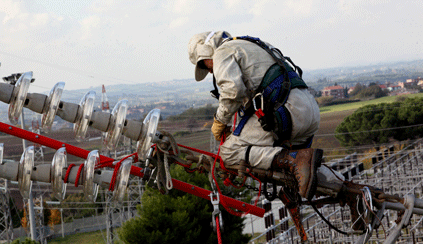Terna, the network operator, is taking at least some of the blame. Nadia Weekes reports.
Alongside all the usual obstacles wind-power developers have to overcome, from complex permitting processes to public opposition, the operators of Italian wind farms are facing endemic power curtailments that are seriously affecting the viability of some of their projects. Speaking at the recent Wind Power Italia event in Rome, Marco Ferrando, CEO and manager in Italy for wind-farm operator International Power, said that power being restricted on the network because of grid inadequacies had cost his company EUR8 million in lost revenue in 2008.
A new compensation system that better safeguards wind-power producers was introduced in 2010, says Ferrando, but the timing of the reimbursements is uncertain and there is no compensation for delays. According to Ferrando, a wind farm that went online in 2009 and suffered curtailments in 2010 would only be compensated in 2024.
Italian wind farms are typically located on the islands of Sicily and Sardinia or in the south of the mainland. Out of 17 grid connections made in 2010, only one was from outside these regions. These areas enjoy Italy's best wind resources and generally lower population density. Unfortunately, they also host the country's least-developed transmission networks.
Italy's transmission network system operator, Terna, has been struggling to keep up with the increase of wind power in the past decade. Installed capacity grew from 563MW in 2000 to 1.9GW in 2006 - by comparison, Spain's installed wind capacity increased from 723MW to 11.6GW over the six-year period 1998-2004 - and has been growing at a steady pace of about 1GW a year since. But grid connections have not developed at the same rate. In 2010, International Power's seven wind farms in central and southern Italy suffered average curtailments of 12-21% of energy generated. Things were better in the first half of 2011, but mostly because of less windy conditions, said Ferrando.
Losing confidence
Some delegates at the Wind Power Italia event questioned Terna's competence in handling power curtailments. One non-Italian operator asked how it had been possible for Terna to grant permission to connect wind farms in the absence of available transmission capacity. A senior Italian wind-energy figure, who asked not to be named, said Terna's roles - an institution providing a service for the system and a company that must make profits for its shareholders - were incompatible.
The view of Italy's renewable-energy association Aper is that the complexity of the authorisation process for new connection lines and the high cost of environmentally acceptable solutions are as much to blame for the current bottlenecks as Terna's alleged inability to plan properly.
Andrea Marchisio, responsible for wind power at Aper, also points the finger at the vast disparity between the number of connection requests filed with Terna and those needed as a result of new wind farms actually coming online. "Filing a request is not very expensive," he says. "If the project stalls, the request remains in the system." Ferrando says connection lines can be saturated with projects that have no chance of ever being built.
This backlog of questionable requests, which is in excess of 90GW, makes it hard for Terna to plan ahead. In the past, it has chosen to wait for wind farms to come online before upgrading the connection and this has caused delays, adds Marchisio. He says Aper has been working systematically on eliminating from the system the projects that have been abandoned.
Terna has an ambitious network-development strategy aimed at increasing Italy's import capacity, reducing power losses and drastically cutting power curtailments. A EUR7.5 billion investment plan promises to cut congestion by 5-9GW over the next 15-20 years. But delivering on promises has been the biggest problem all along.
Italy's complex authorisation process will make it hard for Terna to implement its plans, says Ferrando. "If Terna can accelerate its development programme, then things will improve," he said. "But whether local authorities learn to appreciate the importance of this issue, I don't know. If they do, then we'll see some progress."

.png)



.png)









